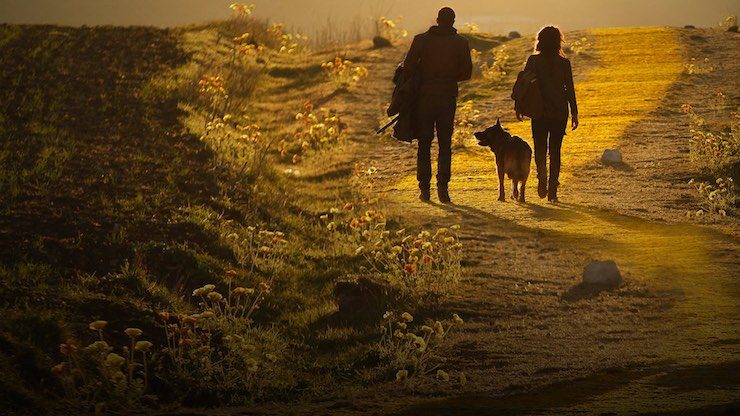So, after watching rival ABC launch more or less successful ten episode fantasy/superhero shows over the past few years, NBC decided to launch one of its own this year, Emerald City, described by eager publicists as “Game of Thrones Meets The Wizard of Oz.”
I rubbed my hands gleefully and told Tor.com that I had to watch anything that sounded this awful. Had to. If only as part of my responsibility as Tor.com’s Resident Oz Expert.
To my surprise, it wasn’t that awful. A little awful. But not as awful as the premise sounds.
[Some spoilers for the first two episodes of Emerald City.]
The story itself starts out on relatively familiar grounds, with Dorothy snatched up by a tornado from her somewhat dull life in Kansas. Somewhat dull, since Dorothy has a Mysterious Mark on her hand that I’m sure will become a plot point fairly soon, and because she’s having casual sex with a coworker since—as the show hints—she’s very bad at intimacy—and because her adoptive mother is in pain and she’s trying to decide if she should connect with her birth mother. And also because for some reason, the cops in her small Kansas town think that trying to shoot people as a tornado is approaching is a really good idea, and because Dorothy just happens to stumble across a dead body in her birth mother’s trailer as that tornado is approaching.
So, maybe not all that dull, but dull compared to everything going on in Oz, which includes fun things like waterboarding torture, political intrigue, people stuck in mud, a gleefully stoned Wicked Witch of the West (the hands down best part of the show), a less stoned Witch of the North, various people who look transplanted straight from Game of Thrones, and a witch desperate to keep a small boy—seemingly dependent on the medication she prepares for him—safely imprisoned behind a wall of branches and thorns.
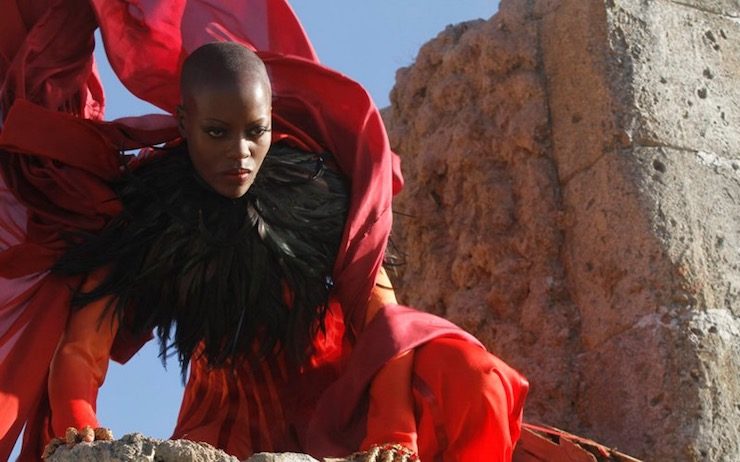
What sets Emerald City apart from most Oz adaptations is not so much its adult tone (seen in the various versions of Wicked and SyFy’s 2007 Tin Man) or its willingness to delve into horror (Wicked again, and the 1985 Return to Oz, not to mention those terrifying flying monkeys from the classic 1939 film), but rather its inspiration: all fourteen of the initial Oz books written by L. Frank Baum. Indeed, although the first episode contains several visual references to the classic 1939 film, and visual proof that Oz adaptations continue to struggle to match that film’s cyclone sequence, by the second episode, it becomes clear that the show has another inspiration in mind entirely: The Marvelous Land of Oz.
Nothing in the show suggests that anyone involved with it read anything other than those fourteen Baum books. What could be a visual reference to The Wonder City of Oz by John O’Neill was, I think, the pure coincidence of someone in the production department having a similar idea. And this is certainly not the Oz created by Gregory Maguire, although his serious consideration of various aspects of Oz may have helped inspire the overall concept. (I expect that the overall profitability of Wicked helped inspire NBC.)
But the show does make multiple references to the later Baum books. In some cases, this is nothing more than the convenience of using a name like “Ojo” (for a character also somewhat associated with the Cowardly Lion) or “Roquat” (who has got to turn out to be thoroughly evil, right? Right? I’m also hoping for at least one reference to scrambled eggs). In at least one case, it’s a direct quote from a later book, Dorothy and the Wizard in Oz, if in a slightly different context (the original statement was made, not about Oz, but another magical land). In other cases, the show references specifics from the books: Glinda’s maids of honor and army of young girls, for instance, here dressed in rather uncomfortable hats, forced into vows of celibacy (if not into actual celibacy) working as spies and advisors to the Wizard of Oz. The Wizard of Oz, incidentally, is bald, as in the books, although counter to book canon, he wears a headpiece to hide this. The Flying Monkeys have been reimagined as some sort of cross between flying monkey, Tik-Tok, and magical movie projectors: I don’t know that this entirely works, but it is rather cool looking. The Scarecrow plays a larger role than either the Tin Woodman or the Cowardly Lion, as he did in most of the books.
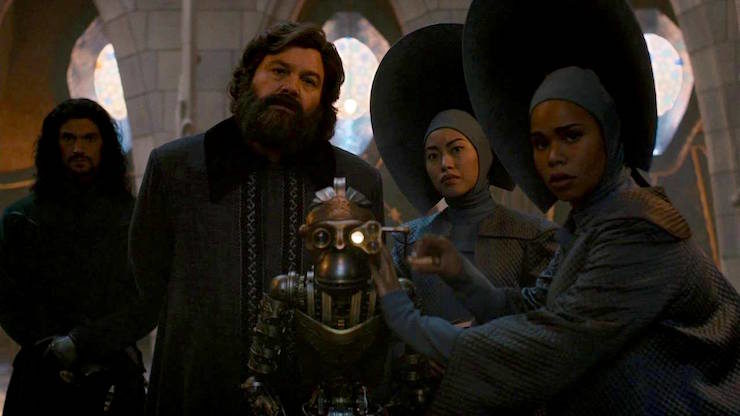
And in my personal favorite nod to the original books, when young Tip and his best friend Jack find themselves on their own in the woods for the first time, completely free except for the small issue that a witch is probably coming after them, they completely fail to set up any sort of watch or security arrangements. I’m thrilled to see Emerald City grasp this character flaw of Tip’s immediately.
But if Emerald City draws its inspiration from the books, it doesn’t hesitate to make some massive changes, starting with the inhuman characters, most of whom are transformed in this version into, well, rather ordinary humans. Thus, Jack Pumpkinhead, instead of a gangly creation of sticks and ever-changing pumpkins, is here an ordinary boy—if still the best friend of Tip. The Scarecrow is also a man, if one lacking brains, and found in a position that’s a cross—oh, forgive the pun—between a crucifixion and the pose of a scarecrow. The strict “NO UNAUTHORIZED USE OF MAGIC” (here instituted by the Wizard, instead of a certain other character) actually seems to be—gasp—obeyed. Dorothy isn’t greeted as a witch-destroying savior, but as a witch-destroying murderer, and rather than the sweet, friendly child of the books and the 1939 film, she carries more than a touch of cynicism and pain.
And in one transformation that I’m going to find a bit difficult to work with, it’s been just two episodes and the Scarecrow and Dorothy already HAVE A THING. Unpopular opinion coming: Look, in my head, Dorothy and the Scarecrow are JUST FRIENDS and will always be JUST FRIENDS, ok? I don’t care if the two of them are exchanging Smoldering Glances and Flirting. THIS IS WRONG.
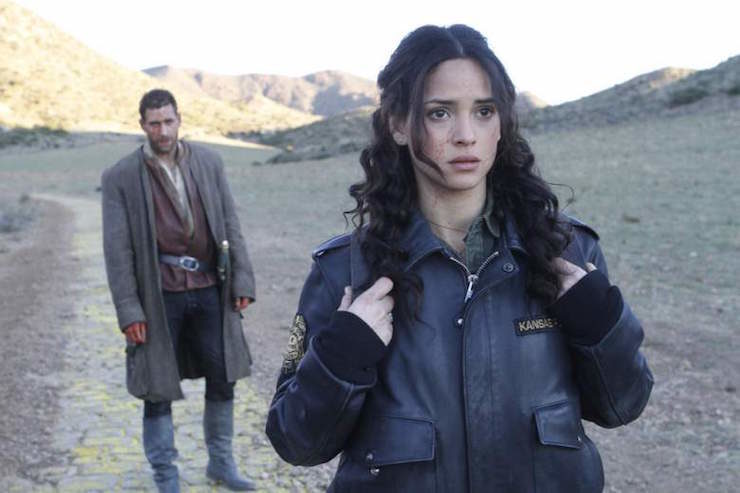
I also can’t help but feel that opium dust is not really the best road paving material and that just maybe Oz should go back to using the yellow bricks from the books and the films. While I’m complaining about this, handrails whenever the Yellow Opium Road just happens to be hugging a cliff would also probably be useful, although in fairness to the producers, most of those shots were taken on location in Croatia, Hungary, and Spain, so that might not have been an option.
Speaking of the location shooting, however, whatever else can be said about Emerald City—and I have lot, but at least some of it will have to be saved for a later post, after I’ve seen more than two episodes—it looks astonishing: drenched in color and beauty and, from time to time, imagination. Some of the costumes—in particular the lovely robes worn by the Witch of the East—are spectacular, and the decision to film in multiple European locations did wonders for allowing Emerald City to have a feel of vastness and multiple landscapes.
Which is why it’s a pity that, so far at least, it doesn’t feel all that cohesive—and not just because the show rather swiftly abandons all of its initial Kansas setup including HEY, YOU LEFT A DEAD BODY IN A MOBILE HOME THAT WAS RIGHT IN THE PATH OF AN INCOMING TWISTER WHAT HAPPENED THERE for the rest of the two episodes (since I feel convinced we’ll get back to this), or because of the various extras who seem to have wandered in from Game of Thrones in even less practical armor. (“Hey,” I wrote happily in my notes. “It’s the Wonderful Winterfell of Oz!”). Emerald City reportedly lingered in development hell for a couple of years before veteran producers Shaun Cassidy and David Schulner were brought in to bring some focus to the show, and this shows. Not only does the general sense of too many cooks remain, and a constant lurching from plot to plot and theme to theme, but two episodes in, and the show doesn’t feel entirely sure what it wants to be, or, with a few exceptions, who its characters are.
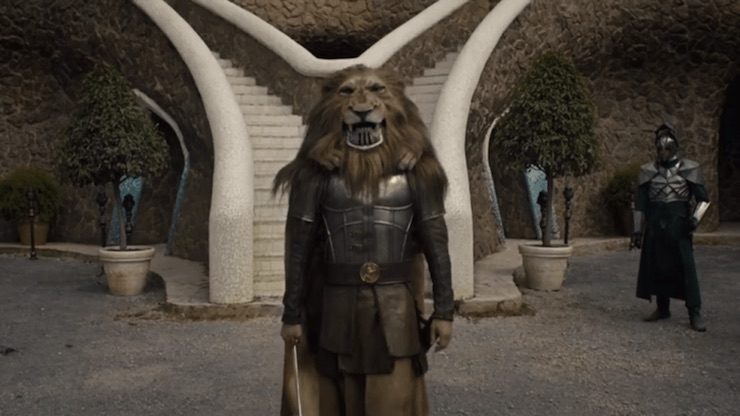
Dorothy in particular ends up all over the place: a skilled nurse with a heart of gold who is stealing pain medication from elderly patients at her workplace; intelligent enough to realize she can work around the “only a witch can kill a witch” prohibition if she can just get the Witch of the East to shoot herself, and then, just moments later, running around asking various confused people in Oz where she can pick up various antibiotics, like, Dorothy, by this point, you’ve seen enough of the place to realize that Oz probably doesn’t have a Walgreens.
The Witches fare somewhat better: Florence Kasumba as the Witch of the East makes the most of being more than a pair of shoes in this version, helped by some stunning costumes, and if Joely Richardson as Glinda, sometimes gives the impression of deeply regretting ever signing on to this, she’s given just enough hints of her own history, agenda and personality to be intriguing. Glinda’s girls aren’t given much of a personality beyond “pregnant” and “not pregnant” (though this leads to one of the best bits of dialogue on the show) and other characters, too, end up fading into the glorious backgrounds.
The show’s very focus on the books makes some of its deviations from book canon feel, well, odd. For instance, as with the 1939 film, Emerald City turns Glinda into the Witch of the North—a decision that leads to some spectacular shots of her white palace. A white palace dotted with, I couldn’t help noting, red flowers, in an apparent allusion to her role as the witch and ruler of the Red Quadling country in the South. That follows the show’s seeming decision to more or less abandon the strict color coding of Oz (something Baum himself was never particularly consistent about)—meaning that the Emerald City isn’t, well, Emerald. Portions of it are quite like Barcelona, which is lovely, but not exactly the Emerald City.
And for all of the callbacks to the original books, so far, for the most part, the show lacks the sheer weirdness of the original Oz books, though the Flying Monkey Movie Projectors Of Distant Evil and a later scene with the Witch of the West doing a modern dance before throwing up magic—in the full sense of the word—come somewhat close. But even that dance scene comes across more as more generic fantasy than anything startling and bizarre. And, naturally, this darker version of Oz had to give up much of its humor—though again, a few scenes with the Witch of the West (really the best part of this show) do something to restore that.
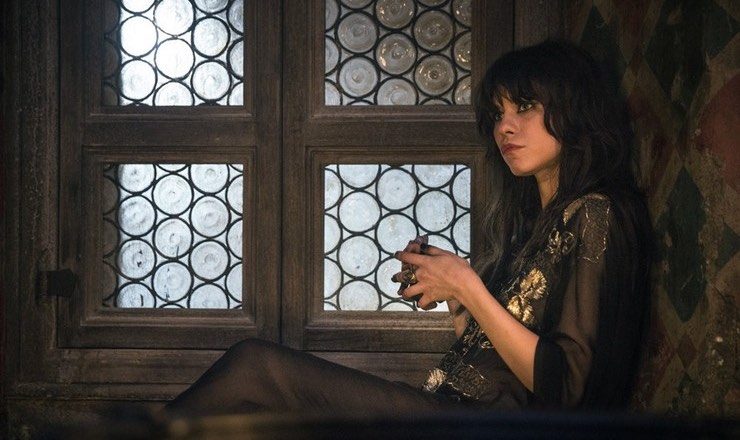
It’s also a bit odd, if fitting given the show’s other clear inspiration, Game of Thrones, to see the originally very American fairyland filled with people chattering in non-American accents, with only the Wizard of Oz sticking to a Midwestern accent. (It wasn’t clarified in the first couple of episodes, but given the other book and film references, it’s probably safe to assume that this Wizard is also from Omaha.) How much of the accents are/were a deliberate choice, and how much the inevitable byproduct of filming in Europe, I can’t tell, but it gives the series a more European feel than Baum ever intended.
And while I was delighted to see Emerald City delve so quickly into Tip’s story, I admit that I will be watching what happens with this plot line with a certain, shall we say, trepidation. Tip’s transformation in The Marvelous Land of Oz was a magical, transformative moment in my own childhood reading, in all the best ways, opening my mind to new possibilities. That could be what happens in the next few episodes of Emerald City.
Or this could be a complete disaster.
I’ll be tuning in to find out.
Mari Ness lives in central Florida.










